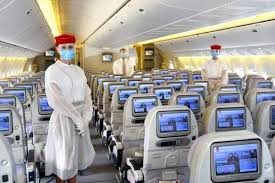Emirates Airlines Resumes Flights to Nigeria After Lengthy Suspension
Emirates Airlines has officially resumed flights to Nigeria after a prolonged suspension that resulted in significant financial losses for the airline. The suspension, which lasted for nearly two years, was primarily due to a foreign exchange crisis in Nigeria that made it difficult for the airline to repatriate funds. Estimates suggest that Emirates may have lost over $85 million in unrepatriated revenue during this period.
Reasons for the Suspension
The suspension, which began in late 2022, was triggered by Nigeria’s inability to release foreign exchange earnings to international airlines. Due to this, Emirates and other airlines struggled to repatriate their earnings back to their home countries. The Central Bank of Nigeria’s tight foreign exchange policies, aimed at stabilizing the naira amidst economic challenges, resulted in airlines being unable to access the foreign exchange they needed to continue smooth operations. The strained relations led Emirates to halt operations, causing disruptions to air travel for thousands of passengers who relied on the airline for connections between Nigeria and Dubai, one of the most popular routes for both business and leisure travelers.

Financial Losses
During the suspension, Emirates’ financial exposure in the Nigerian market was substantial. Reports estimate that the airline was unable to access nearly $85 million in ticket sales, which remained trapped due to the foreign exchange controls. The suspension of flights meant the airline missed out on millions more in potential revenue from passenger traffic, cargo services, and other associated operations during the peak travel periods.
Key Partners and Market Presence
Before the suspension, Emirates Airlines was one of the most prominent international carriers in Nigeria, operating multiple daily flights from Lagos and Abuja to Dubai. The airline partnered with top Nigerian travel agencies, corporate firms, and luxury hotel chains to cater to high-end travelers, including businessmen and holidaymakers. It also collaborated with Nigerian airports and local suppliers for ground handling services, making it a critical part of the country’s aviation industry.
Now that flights have resumed, the airline is expected to reclaim its strong market position. The resumption is a relief for the Nigerian business community and the large diaspora, who rely heavily on the connections provided by the airline.








